
The solutions to Tuesday’s problems. The original text is in yellow. You can keep score if you like.
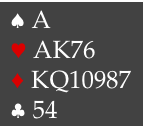
1. In a conventional auction, with the opponents silent, you hear that your partner has either 5♣-4♦ or 4♣-5♦, 2 aces, the ♠K, and a minimum opening bid. The auction has reached the level of 5♠, now what?
Alternatively, try this problem at the other table. Again, partner shows a minimum opening bid but this time with specifically 5♣-4♦. Your RHO overcalled in spades. Again, 2 aces and the ♠K are shown. Now what?
Solution: If partner has 9 cards (54 or 45) in the minors, he will have only 4 in the majors, giving him something like ♠Kx/♥xx/♦Axxx/♣Axxxx. You can now play the hand before you have seen his. Win the opening lead, unblock the ♠A if necessary, draw a few trumps ending in the dummy, discard a club on the ♠K and claim the rest on a cross-ruff. This always works with trumps 2-1, with trumps 3-0 there are still chances depending on the exact spot cards. Obviously, the contract gets even better if partner has ♠Kx/♥xx/♦Axxxx/♣Axxx. With ♠Kxx/♥x/♦Axxx/♣Axxxx the play will be the same.

However, the real hand was this. That is unlucky, the opponents never bid spades holding 11 of them. Back in 1996, the late Dick Freeman bid 7♣, losing 16, when the also late Paul Soloway at the other table bid only 6 in the alternative auction. Give partner another spade and you win 13. Very unlucky. I still think that Freeman took the best action here.
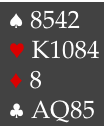
2. White against red, you pick up this collection and hear 1♦ on your right. Natural, but limited to 16 hcp and practically denying a 4 card major. You double, pass, pass by partner converting it into penalties. Opener decides to run by redoubling, you pass, 1♠ on your left and 2 passes. Now what?
Solution: Your double was highly aggressive but you will have to live with that. The one thing to note, is that partner’s pass of 1♠ created a forcing auction, once you have decided to play for penalties, they shall not escape. Passing is therefor out of the question. It looks to me that you have to double here to show spades and, if that is passed out, lead one and hope for the best. Oh, you are not on lead, well, double and hope that partner leads a spade.
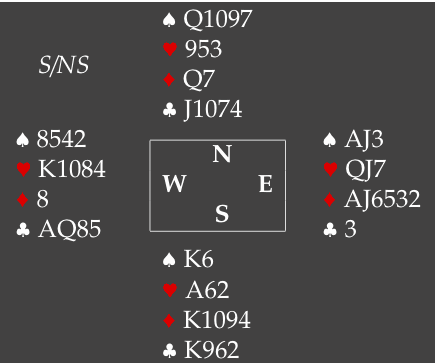
In practice, west tried 2♣ and east 3NT, expecting more in terms of high cards. 3NT went off 1 for an 11 imp loss, double-dummy, EW can take 9 tricks against 1♠, for +800. Of course, NS can decide to run again, but 2♣ will also be down 3.
At the other table, south decided to pass 1♦. Diamond lead, club back to the ♣Q, ♣A, club ruff, ♥Q ducked by south and overtaken with the ♥K, another club ruff and down 500.
If you bid, assume partner will bid game, for an 11 imp loss. If you double 1♠, score at least +7.
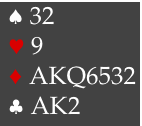
3. Pass from partner, 2
♥
on your right (11-15, 4
♠
-5
♥
). You can bid 3
♥
showing a running suit but denying stoppers in the majors, 4
♥
on your left, pass, pass. Now what? And what do you bid if LHO continues with 5
♥
?
I forgot to mention that you are vulnerable against not. Still, in 5♦ you are at most down 2, for -500, and then 4♥ will almost certainly make, so you bid 5♦, expecting to lose no more than 3 imp’s for 420 against 500 with a chance to pick up a lot more.
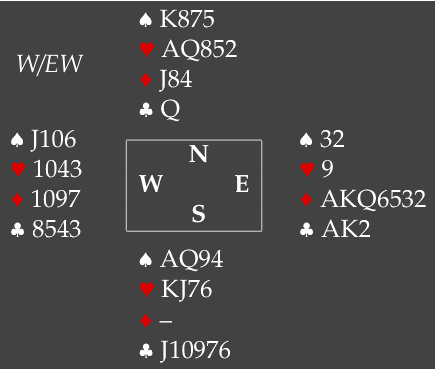
Now LHO continues with 5♥ and I think you should pass this, you have bid your hand and partner has given his opinion. No, Robinson decided to double and south redoubled. No defense after the ♣A lead (or any lead for that matter), and the unusual score of -1200.
The other table didn’t get any higher than 4♥ for a 13 imp loss, after south failed to appreciate the value of his hand. Passing a heart contract is good for a wash.
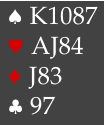
4. You get this hand and hear 1
♠
on your right, partner passes, 2
♦
on your left, 2NT from opener and 3NT on your left. The opponents play canape, which means that opener has shown exactly 4
♠
in more or less balanced hand. He can still have 5 clubs though. Your lead?
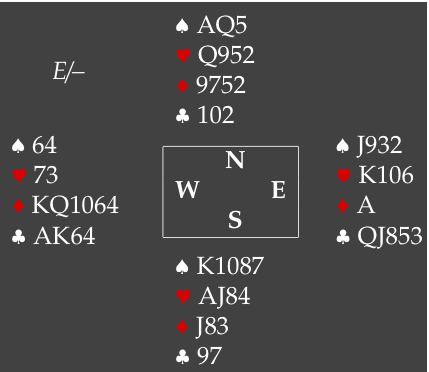
South decided to ignore the opening bid and simply led the 4th from his best suit, or ♠7. Won by the ♠Q. North returned a small heart and declarer finished down 4 a few seconds later. The important thing here is that one should study the opponent’s system. Against a 5 card major system, one would never lead a spade, but here EW play canape and the 1♠ can be bid on a bad 4 card suit. That makes the spade lead worth considering. At the same time, a club lead appears to be out against a canape system as it is frequently east’s long suit. By the way, also well defended by north.
At the other table, spades were never bid, so it was a lot easier for south to find the ♠7 lead. North won and continued the suit, resulting in only down 1. If you are keeping score, score +4 if you led a spade, I’ll give you that partner finds the good heart return, -10 if you didn’t, as declarer will quickly cash his tricks on any other lead.
If you did all 4 problems wrong, you score -50 even with the unlucky board 1, if you got it all right, you score +24. The final difference in the match was only 2 imp’s, so getting 1 or 2 problems right was the difference between winning and losing.
